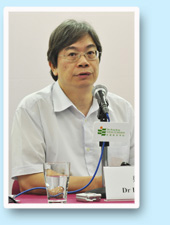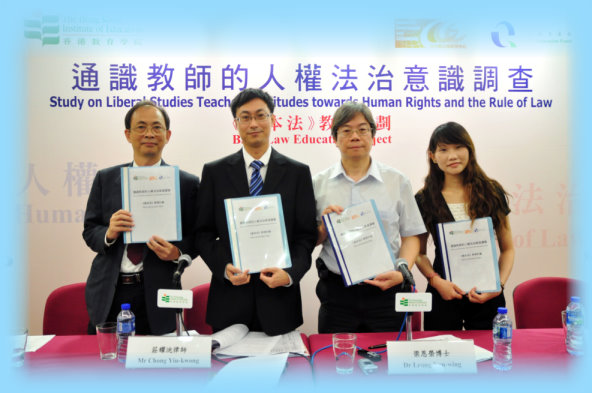 |
 |
| |
Selected Development Project |
| |
 |
| Project Title |
Basic Law Education Project |
|
| |
| Principal Investigator |
Dr. Leung Yan Wing |
|
| |
| Area of Research Project |
Curriculum Programme and Education |
|
|
|
|
| |
| Project Period |
|
|
| Objectives |
The objectives of the Project were to 1) conduct training sessions to Liberal Studies (LS) teachers of the eight partner schools to provide them with the necessary knowledge and pedagogy in teaching Basic Law, human rights, and the rule of law, as well as related topics, in the LS curriculum; 2) assist LS teachers in school-based curriculum development on the teaching of Basic Law, human rights, and the rule of law; 3) develop and maintain a web-based resource centre containing teaching kits, useful web links, and relevant reference materials, among others; and 4) construct instruments for measuring (a) the attitudes of LS teachers towards and knowledge of the Basic Law, human rights, and the rule of law and (b) human-rights-friendly school ethos.
|
 |
|
| Methods Used |
 The school-based curriculum development adopted an action-research approach. Need assessment was conducted at the beginning of the project with each individual school to identify its needs. Pre-test interviews and pre-test questionnaires were then conducted to assess the attitudes towards and knowledge of Basic Law, human rights, and the rule of law of the partner school teachers and students before intervention. Next, training workshops targeting their needs were conducted to enhance their knowledge and pedagogy. The team then conducted discussions with the teachers regarding curriculum development in person or through email and phone conversations. Comments and suggestions for improvements were given by the team on the teaching plans submitted by teachers. Class observations and post-class observation interviews were arranged to evaluate whether teachers could apply what they learned from the workshops in their teaching. Post-test interviews and post-test questionnaires were then conducted to assess the change of attitudes towards and knowledge of Basic Law, human rights, and the rule of law of the partner school teachers and students after class observations. Finally, a sharing session was conducted to report the findings of the individual partner schools with each partner school, and sharing seminars and dissemination seminar were organized to share the findings with all schools and the public. The school-based curriculum development adopted an action-research approach. Need assessment was conducted at the beginning of the project with each individual school to identify its needs. Pre-test interviews and pre-test questionnaires were then conducted to assess the attitudes towards and knowledge of Basic Law, human rights, and the rule of law of the partner school teachers and students before intervention. Next, training workshops targeting their needs were conducted to enhance their knowledge and pedagogy. The team then conducted discussions with the teachers regarding curriculum development in person or through email and phone conversations. Comments and suggestions for improvements were given by the team on the teaching plans submitted by teachers. Class observations and post-class observation interviews were arranged to evaluate whether teachers could apply what they learned from the workshops in their teaching. Post-test interviews and post-test questionnaires were then conducted to assess the change of attitudes towards and knowledge of Basic Law, human rights, and the rule of law of the partner school teachers and students after class observations. Finally, a sharing session was conducted to report the findings of the individual partner schools with each partner school, and sharing seminars and dissemination seminar were organized to share the findings with all schools and the public.
For the survey of attitudes of LS teachers towards and knowledge of Basic Law, human rights, and the rule of law, quantitative research method was adopted. Self-administered questionnaires were mailed to all 460 secondary schools in Hong Kong for the LS teachers to complete. The evaluation of human-rights-friendly school ethos adopted a mixed approach of both quantitative and qualitative research methods. Questionnaires were sent to the partner schools who had committed their teachers and students to complete the task. Data collected were then analysed to identify the strengths and weaknesses of each school, as well as the discrepancies of the scores between teachers and students. Focus group discussions were then conducted with teachers and students separately for obtaining in-depth information regarding possible explanations for the extreme scores and the discrepancies.
|
| Summary of Findings |
The findings of school-based curriculum development revealed that the knowledge and pedagogy of partner school teachers in Basic Law, human rights, and the rule of law related topics were inadequate. The partner schools had difficulties in understanding the technical concepts and in finding current issues and reference materials suitable for the students. The situation was especially severe among the less-experienced teachers. More support should be provided to LS teachers for enhancing their knowledge and pedagogy.
According to the findings of the survey of LS teachers’ attitudes towards and knowledge of Basic Law, human rights, and the rule of law, the support of LS teachers for the core values of human rights and the rule of law that Hong Kong has been upholding is barely adequately. For instance, over 30% of the respondents agreed that the use of secret torture by the police in obtaining evidence in some special circumstances, such as combating Triad activities, is acceptable. The performance on knowledge was also not satisfactory. The average score for the respondents was 7.48 out of 17 questions. Only 33.4% of the respondents scored a total mark equal to or higher than 9. More training should be provided to LS teachers in order to improve their attitudes and knowledge.
The findings of the evaluation of human-rights-friendly school ethos revealed that the students’ scores for fair and equal treatment by teachers were especially low. Significant differences were found between the scores of students and teachers in certain areas. There were even contradictory findings in some of the items (i.e., where students rated negatively but teachers rated positively). Interviews with teachers and students revealed that the conflicts always occurred regarding the manners by which teachers dealt with student discipline. Teachers generally believed that they had treated every student equally and had given sufficient chances for students to defend themselves and appeal their decisions. However, students felt that those with poor academic performance were always discriminated against. Schools should be encouraged to conduct this type of evaluation and deal with the conflicts as soon as possible in order to build up a school ethos that respects human rights. |
Impact |
The LS from the 8 partner schools were the direct beneficiaries. Through participating in our workshops, teachers from the partner school learned more about the knowledge of and pedagogy for the teaching of Basic Law, human rights, and the rule of law, which they had found difficult to learn through other channels. Teachers also mentioned that they could identify their areas of improvement through the class observations and post-class observation interviews with the team members. They found our prepared glossary of the technical concepts related to Basic Law, human rights, and the rule of law in the LS curriculum useful for clarifying specific concepts. The also found the comments of team members regarding their teaching plans and materials to be useful. After we had commented on the teaching plans and materials of partner school teachers, we uploaded their teaching materials, with their permission, for sharing among partner schools. It created a platform for sharing teaching experiences and materials for the teachers, and encouraged inter-school collaboration among the partner schools.
Apart from partner school teachers, LS teachers from all secondary schools also benefited from the Project. Our team had published a booklet entitled 《基本法》教育計劃教與學分享:人權教育與法治教育的教與學》, which contained workshop materials, teaching kits, a glossary edited by the team, articles written by the team, survey instruments, and reference materials, among others, which were ready for use in class or as support materials.
The partner schools participating in the Project also benefitted. Our team offered seminars and workshops to the partner schools on their staff development day, which gave all teachers in the school a chance to learn more legal knowledge regarding situations that might arise in school context. These sessions helped to enhance the understanding of teachers regarding the potential legal liability in school and raise their awareness and concern regarding their legal responsibility towards students. The participation of the three partner schools in evaluating their human-rights-friendly school ethos helped to identify their weaknesses and promote a rights-respecting atmosphere in their schools.
Moreover, the seminars organized by the team facilitated knowledge transfer and provided a platform for discussion among academics, teachers, student teachers, and NGOs. The publications of the survey findings and the journal articles, especially Are Liberal Studies teachers ready to prepare human rights respecting students? A portrait of teachers' attitudes towards human rights by Leung, Y. W. and Lo, Y. L. (2012, in press), also drew attention from academics, the public, teachers, and NGOs, among others, and facilitated sharing and discussions among both local and international academics for further research. |
Selected Publications Related to the Study |
-
Leung, Y. W. & Lo, Y. L. (2012, in press). Are Liberal Studies teachers ready to prepare human rights respecting students? A portrait of teachers' attitudes towards human rights. Intercultural Education, 23(5).
-
Basic Law Education Project Team. (2011). Sharing of teaching and learning experiences: Teaching and learning of human rights education and the rule of law education. Hong Kong: Centre for Governance and Citizenship, The Hong Kong Institute of Education. (In Chinese) 《基本法》教育計劃小組(2011)。《基本法》教育計劃教與學分享:人權教育與法治教育的教與學》。香港:香港教育學院管治與公民研究中心。
-
Leung, Y. W. & Lo, Y. L. (2012). The urgent need to develop rule of law education in Hong Kong. Hong Kong Lawyer., February Issue.
-
Basic Law Education Project Team. (2011). Technical report on the findings of the survey on Liberal Studies teachers’ attitudes towards and knowledge of human rights, the rule of law and Basic Law (Part I: Simple descriptive statistics analysis). Hong Kong: Author.
-
Basic Law Education Project Team (2012). Technical report on exploratory factor analysis, confirmatory factor analysis and Rasch analysis of the instrument measuring Liberal Studies teachers’ attitudes towards human rights. Hong Kong: Author.
|
| Biography of Principal Investigator |
Dr. Leung Yan Wing (梁恩榮) is an Associate Professor of The Department of Education Policy and Leadership, the Associate Director of the Centre for Governance and Citizenship, and the Coordinator of the Education Policy Forum of the Institute. Dr. Leung received his Ph.D. in Civic Education from the University of Sydney. Currently, he researches and teaches mainly in the areas of civic education, human rights education, national education, values education, civic missions of schools, political socialization, students’ participation, and civil society and educational policies. Dr. Leung has published widely in international, regional, and local journals, and has presented papers in many international and local conferences. He has been involved in many internally and externally funded projects and consultative work with schools. Dr. Leung has led projects preparing teaching packages for schools. He also engages actively in public policy debates in local media. In addition, Dr. Leung participates actively in civil society, both locally and internationally. He serves as a coordinator of the Hong Kong Alliance for Civic Education, is an executive member of the CIVITAS International, and is a founder of the Asian Network of Human Rights Education. |
Funding Source |
| Quality Education Fund |
|
|
|
 |
|
 |


